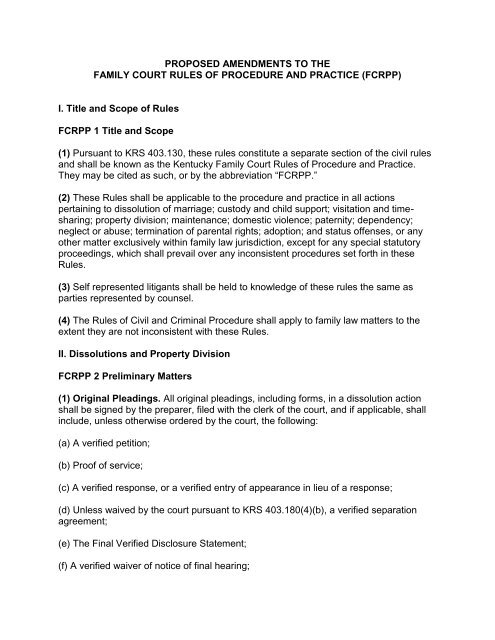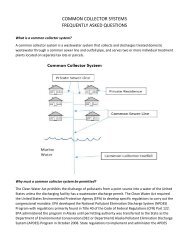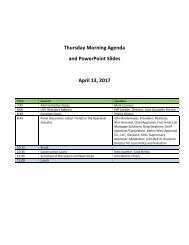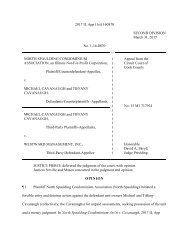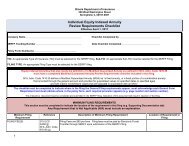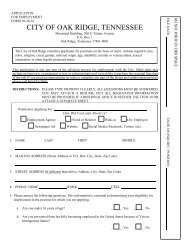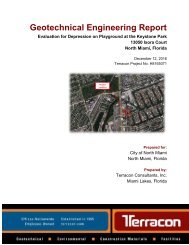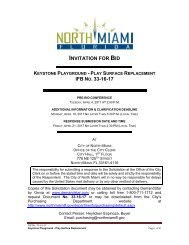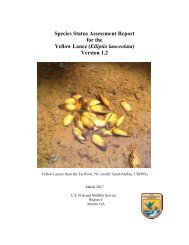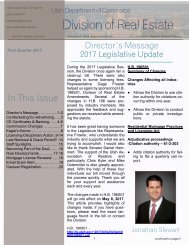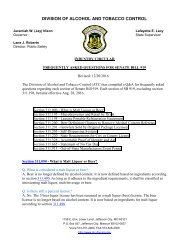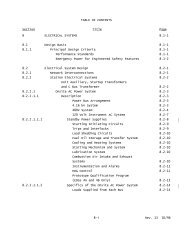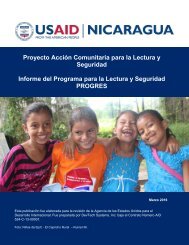timesharing
ProposedAmendments_FCRPP
ProposedAmendments_FCRPP
You also want an ePaper? Increase the reach of your titles
YUMPU automatically turns print PDFs into web optimized ePapers that Google loves.
PROPOSED AMENDMENTS TO THE<br />
FAMILY COURT RULES OF PROCEDURE AND PRACTICE (FCRPP)<br />
I. Title and Scope of Rules<br />
FCRPP 1 Title and Scope<br />
(1) Pursuant to KRS 403.130, these rules constitute a separate section of the civil rules<br />
and shall be known as the Kentucky Family Court Rules of Procedure and Practice.<br />
They may be cited as such, or by the abbreviation “FCRPP.”<br />
(2) These Rules shall be applicable to the procedure and practice in all actions<br />
pertaining to dissolution of marriage; custody and child support; visitation and <strong>timesharing</strong>;<br />
property division; maintenance; domestic violence; paternity; dependency;<br />
neglect or abuse; termination of parental rights; adoption; and status offenses, or any<br />
other matter exclusively within family law jurisdiction, except for any special statutory<br />
proceedings, which shall prevail over any inconsistent procedures set forth in these<br />
Rules.<br />
(3) Self represented litigants shall be held to knowledge of these rules the same as<br />
parties represented by counsel.<br />
(4) The Rules of Civil and Criminal Procedure shall apply to family law matters to the<br />
extent they are not inconsistent with these Rules.<br />
II. Dissolutions and Property Division<br />
FCRPP 2 Preliminary Matters<br />
(1) Original Pleadings. All original pleadings, including forms, in a dissolution action<br />
shall be signed by the preparer, filed with the clerk of the court, and if applicable, shall<br />
include, unless otherwise ordered by the court, the following:<br />
(a) A verified petition;<br />
(b) Proof of service;<br />
(c) A verified response, or a verified entry of appearance in lieu of a response;<br />
(d) Unless waived by the court pursuant to KRS 403.180(4)(b), a verified separation<br />
agreement;<br />
(e) The Final Verified Disclosure Statement;<br />
(f) A verified waiver of notice of final hearing;
(g) A verified deposition or interrogatories for proof of the allegations of the petition if<br />
done without a hearing;<br />
(h) A divorce education certificate; and<br />
(i) A child support work sheet.<br />
(2) Multiple Actions. When actions concerning the same subject matter are filed in<br />
different circuits, the first action filed shall be the controlling action, subject to transfer by<br />
the court of that circuit on a motion for forum non conveniens or other appropriate legal<br />
grounds. A motion for transfer shall be filed prior to or with the response. On notice to<br />
the parties, the courts in both circuits may confer concerning the proper venue.<br />
(3) Preliminary Mandatory Disclosure. A preliminary verified disclosure statement<br />
which contains the contents of the official AOC form, AOC-238, Preliminary Verified<br />
Disclosure Statement, shall be exchanged between the parties within 45 days of service<br />
of the petition on the respondent, and objections thereto shall be exchanged 20 days<br />
thereafter but the disclosures shall not be filed in the record unless ordered by the court<br />
or required by local rule. The official AOC form, AOC-238, is available for use in<br />
compliance with this rule.<br />
(4) Exchange of Information and Documents. The parties shall sign and return<br />
specific releases for relevant information and documents unless objected to in writing.<br />
Such releases shall contain a provision directing that any information and/or documents<br />
provided in writing to the requesting counsel or pro se party shall simultaneously be<br />
transmitted to the other counsel or pro se party, at requesting party's expense. Upon<br />
objection, the requesting party may file a motion to compel.<br />
(5) Status Quo Orders. Without limiting a party's relief under CR 65, upon notice and<br />
opportunity to be heard, a court may enter a status quo order regarding disposition of<br />
the marital estate. Any such order may be entered on the AOC-237. A status quo order<br />
may include but not be limited to the following:<br />
(a) Neither party shall, except as necessary to pay reasonable living expenses, incur<br />
unreasonable debt, sell, encumber, gift, bequeath or in any manner transfer, convey or<br />
dissipate any property, cash, stocks or other assets currently in their possession or in<br />
the control of another person, company, legal entity or family member without<br />
permission of the court or an agreed order signed by both parties or their attorneys.<br />
(b) Neither party shall allow the cancellation or lapse of any health, life, automobile,<br />
casualty or disability insurance currently covering themselves or a family member or<br />
change the named beneficiaries on such policies prior to receiving permission of the<br />
court or filing an agreed order signed by both parties or their attorneys.<br />
2
(6) Case Management.<br />
(a) Mediation.<br />
[(1)](i) The parties may agree to mediate at any time. After notice and opportunity<br />
to be heard and unless prohibited by KRS 403.036 (domestic violence), the<br />
parties may be ordered to mediate any issues before further proceedings.<br />
[(2)](ii) Within 10 days of a final mediation, if the parties have been unable to<br />
resolve all issues, the petitioner shall file a motion for a case management<br />
conference or final hearing date, unless previously scheduled by the court.<br />
(b) Case Management Conference.<br />
[(1)](i) Unless notice is given to the court that a case is being mediated, within 60<br />
days of service of the petition upon the respondent, the petitioner shall file a<br />
motion for a case management conference.<br />
[(2)](ii) Both parties and their counsel shall attend the conference, unless<br />
otherwise ordered by the court.<br />
[(3)](iii) Each party shall file the following documents at least 7 days prior to the<br />
conference:<br />
[(i)](a) Any related motions; and<br />
[(ii)](b) Any stipulations or agreements reached.<br />
[(4)](iv) In the event of failure of a party or parties to appear at the conference,<br />
the court may, in accordance with its order, conduct a hearing in which proof may<br />
be taken or the case dismissed, as the court may determine appropriate.<br />
(7) Trial. The trial shall not be continued except as otherwise ordered for good cause<br />
shown on the record.<br />
(8) Temporary Motions.<br />
(a) Any ex parte motion shall be accompanied by a supporting affidavit sufficient to state<br />
grounds for injunctive relief, and if granted, shall be set for hearing with all parties at the<br />
earliest available date.<br />
(b) Any pendente lite motions shall be served on the opposing party and set for a<br />
hearing before the court unless otherwise agreed to by the parties.<br />
3
FCRPP 3 Obtaining a Decree of Dissolution<br />
(1) Matters Not Requiring a Trial.<br />
(a) If the parties reach an agreement on all issues, a decree of dissolution may be<br />
obtained without a trial by filing a motion or agreed order to submit for decree of<br />
dissolution of marriage, and the parties shall further comply with any local rule requiring<br />
additional filings.<br />
(b) A decree shall not be final until the original is signed by the court and entered by the<br />
clerk.<br />
(c) If the parties reach an agreement on individual issues short of settling the entire<br />
case, the agreement, signed by both parties, may be submitted to the court for approval<br />
and entry.<br />
(2) Default cases.<br />
In all cases of default, the motion to submit for decree shall state the following:<br />
(a) That no answer or pleadings have been received by the moving party or counsel;<br />
(b) That the respondent was personally served and 20 days have elapsed since service,<br />
or that a warning order attorney was appointed, has filed a report and affidavit and that<br />
50 days have elapsed since appointment of the warning order attorney; and,<br />
(c) Shall include certification that the motion and notice of trial or submission has been<br />
served on the opposing party at the party's last known address; and if the party is on<br />
active military duty, that the provisions of the Servicemembers[‘] Civil Relief Act have<br />
been followed.<br />
(3) Matters Requiring a Trial.<br />
(a) If the parties do not reach an agreement on any or all issues, a trial shall be held, on<br />
motion, as set by the court.<br />
(b) No later than 5 days prior to the trial, the parties shall file a final verified disclosure<br />
statement in the record if property matters are in dispute at that trial; or the parties may<br />
file an affidavit that there are no changes in circumstance since the completion of the<br />
preliminary verified disclosure statement, if filed. The final verified disclosure statement<br />
shall contain the contents of the official AOC form, AOC-239, Final Verified Disclosure<br />
Statement, which is available for use in compliance with this rule. Further, any affidavit<br />
filed in lieu of the final verified disclosure statement shall contain the content of the<br />
official AOC form, AOC-239.2, Affidavit of No Change in Circumstances Requiring the<br />
Filing of a Final Verified Disclosure Statement, which is also available for use in<br />
compliance with this rule.<br />
4
(c) A copy of final verified disclosure statement or the affidavit in (b) above, together<br />
with any supporting documentation, shall be provided to the opposing party 15 days<br />
prior to trial unless otherwise ordered by the court.<br />
(4) Evidence and Exhibits.<br />
(a) A court-appointed expert's report shall be in lieu of live testimony, unless either party<br />
subpoenas the expert to testify or unless the court orders otherwise. The party who<br />
subpoenas the expert shall be responsible for paying the expert's fee for appearance at<br />
trial, unless otherwise ordered by the court.<br />
(b) In the trial order, the court shall order parties to exchange the list of exhibits to be<br />
submitted at trial. Absent good cause shown, failure to provide an exhibit list may result<br />
in the exclusion of such exhibit at trial.<br />
(c) Originals of depositions, interrogatories or requests for admissions, shall not be filed<br />
in the court record unless offered as proof. The attorney who noticed the taking of a<br />
deposition, or propounded the interrogatories or requests for admissions, shall be the<br />
custodian of the record for the originals, and shall present them when directed by the<br />
court or at the request of any party.<br />
[(5) Post-Decree Litigation.<br />
A fee of $50.00 shall be paid by the movant in domestic relations cases reopened after<br />
6 months from the entry of the decree for the purpose of modifying the decree. This<br />
does not include motions in 42 U.S.C. Title IV-D cases for child support enforcement.<br />
The clerk shall collect any fee upon the filing of the motion, unless the movant files a<br />
motion to proceed in forma pauperis.<br />
(a) Reopening for purposes of this rule means any motion for modification of an order<br />
filed more than 6 months after entry of the order. A case is considered reopened until all<br />
matters in the motion are resolved.<br />
(b) Once a case is reopened and the fee is paid, another fee will not be required unless<br />
6 months or more have elapsed since entry of the order on the motion that re-opened<br />
the case.<br />
(c) This fee shall not be required for motions to enforce an order and which are so<br />
titled.]<br />
FCRPP 4 Procedures Before the Domestic Relations Commissioner<br />
(1) In jurisdictions having no family court, the circuit judge may appoint a domestic<br />
relations commissioner, who shall serve at the pleasure of the court. The court may<br />
refer domestic relations matters under KRS Chapter 403 to the domestic relations<br />
commissioner, except for domestic violence proceedings, contempt proceedings and<br />
5
injunctive relief proceedings. Any local rules relating to domestic relations<br />
commissioners shall be approved by the Chief Justice and be uniform in all divisions of<br />
circuit court within each county of each circuit.<br />
(2) Each domestic relations commissioner shall have been licensed to practice law for<br />
at least eight years at the time of appointment, unless otherwise authorized by the Chief<br />
Justice, and shall satisfy the annual continuing legal education minimum requirement<br />
with domestic relations law education. Additionally, each domestic relations<br />
commissioner shall attend a training program, at least once every two years, which<br />
focuses on the dynamics and effects of domestic violence including the availability of<br />
community resources, victims' services and reporting requirements. Domestic relations<br />
commissioners shall not otherwise engage in the practice of domestic relations law.<br />
(3) The domestic relations commissioner shall hear all matters and file a report promptly<br />
pursuant to KRS 454.350(2). Testimony may be heard orally before the commissioner<br />
or by deposition or interrogatory. All actions involving indigents shall be heard by the<br />
commissioner without fee. Proceedings before the commissioner shall be recorded by<br />
audio or video and a recording log shall be kept. The domestic relations commissioner<br />
shall file the recorded hearings and the recording log in the record with the clerk of the<br />
court. Transcriptions shall not be required for any purpose within this Rule.<br />
(4) The domestic relations commissioner shall have the authority to make<br />
recommendations to the judge regarding motions for temporary orders of custody,<br />
support and maintenance. All temporary and final decrees and orders shall be entered<br />
by the court upon review of the recommendations of the domestic relations<br />
commissioner as set forth below:<br />
(a) Within 10 days after being served with a copy of the commissioner's<br />
recommendations, any party may file written objections thereto with the court. After<br />
hearing the court may adopt the recommendations, modify them, or reject them in whole<br />
or in part, or may receive further evidence or may recommit them for further hearing.<br />
(b) The circuit court shall sign any recommended temporary or post-decree order within<br />
10 days after the time for filing exceptions has run unless a motion for a hearing on the<br />
exceptions has been filed. All temporary recommendations of the domestic relations<br />
commissioner which become orders of the court shall be without prejudice and subject<br />
to the court's de novo review on final hearing.<br />
(c) If the parties stipulate that the commissioner's findings of fact shall be final, only<br />
questions of law arising upon the recommendations shall thereafter be considered.<br />
(d) All final decrees shall be entered by the court within 20 days of submission if no<br />
exceptions have been filed. If exceptions have been filed, entry of the final decree shall<br />
occur within 10 days of disposition of the exceptions.<br />
6
(5) For any case assigned, the domestic relations commissioner shall receive a fee of<br />
$60 per hour, assessed at a rate of $15.00 for each quarter hour or part thereof. Such<br />
fees shall be paid through the office of circuit court clerk to the commissioner and shall<br />
be due on the fifth working day following the conclusion of the hearing. No more than<br />
$600 shall be assessed in any case regardless of the number and length of hearings<br />
unless recommended by the circuit judge and approved by the Chief Justice for<br />
extraordinary circumstances shown. If a case is reopened additional fees totaling not<br />
more than $200 may be assessed. No more than $15 shall be assessed in any<br />
uncontested divorce.<br />
(6) The compensation of domestic relations commissioners shall be by fee charged<br />
upon the parties, or paid out of any fund or subject matter of the action which is in the<br />
custody or control of the circuit court. This compensation shall be paid to the circuit<br />
court clerk, who shall issue payment to the commissioner.<br />
(7) All domestic relations commissioners shall be limited in their total personal<br />
compensation derived from fees to not more than $48,000 per annum unless approved<br />
by the Chief Justice. Fees in excess of the personal compensation of the commissioner<br />
shall be remitted to the Administrative Office of the Courts with the annual accounting<br />
for all amounts received.<br />
(8) The Administrative Office of the Courts shall establish audit and accounting<br />
standards, prescribe bookkeeping and accounting practices and procedures, and<br />
otherwise perform audits and oversee the financial accounts of domestic relations<br />
commissioners. A copy of any audit shall be submitted by the Administrative Office of<br />
the Courts to the chief judge of the circuit. In the event that the audit reveals an<br />
accounting or other irregularity, a copy shall also be submitted to the Chief Justice.<br />
(9) The commissioner shall not retain his or her recommendations as security for his or<br />
her compensation. When the party ordered to pay the compensation allowed by the<br />
court does not pay it after notice and within the time prescribed by the court, that party<br />
may be subject to civil contempt.<br />
FRCPP 5. Maintenance.<br />
[(1) A motion for temporary maintenance shall be accompanied by copies of the<br />
movant's last three pay stubs or, if movant is self-employed, proof of the movant's<br />
current income, and by an affidavit setting forth movant's monthly expenses and income<br />
and the monthly income of the party from whom maintenance is sought.<br />
(2) The notice of hearing accompanying a motion for temporary maintenance shall<br />
contain the following statement: “You must file with the Court, at least 24 hours prior to<br />
the time of the hearing, a responsive affidavit setting forth your net monthly income and<br />
expenses and attach copies of your last three pay stubs or, if self-employed, proof of<br />
your current income.”<br />
7
(3)](1) Motions to Establish or Modify Temporary or Permanent Maintenance<br />
(a) All motions to establish or modify temporary or permanent maintenance shall be<br />
accompanied by the following:<br />
(i) A statement from movant setting forth the amount of maintenance requested.<br />
(ii) Copies of the movant's last three pay stubs or, if movant is self-employed,<br />
proof of the movant's current income.<br />
(iii) An affidavit setting forth movant's monthly expenses and income and the<br />
monthly income of the party against whom the motion is brought, if known.<br />
(iv) The most recently filed federal and state income tax return.<br />
(v) The notice of hearing accompanying the motion shall contain the following<br />
statement “You must file with the Court, at least 24 hours prior to the time of the<br />
hearing, copies of your last three pay stubs, or if self-employed, proof of your<br />
current income, your most recently filed federal and state income tax returns and<br />
an affidavit setting forth your monthly expenses and income.”<br />
[(b) The respondent shall file the above financial information with the court and serve it<br />
on the opposing party 5 days prior to the hearing.]<br />
(b) A respondent shall file the following information with the court and serve the movant<br />
at least 24 hours prior to the hearing:<br />
(i) Copies of the respondent’s last three pay stubs or, if self-employed, proof of<br />
current income.<br />
(ii) The most recently filed federal and state income tax returns.<br />
(iii) An affidavit setting forth the respondent’s monthly expenses and income.<br />
[(c) The notice of hearing accompanying a motion to establish or modify permanent<br />
maintenance shall contain the following statement: “You must file with the court, at least<br />
24 hours prior to the time of the hearing, copies of your last three pay stubs, or if selfemployed,<br />
proof of your current income and by an affidavit setting forth your monthly<br />
expenses and income, and the most current federal and state tax returns.”]<br />
III. Custody, Shared Parenting, Visitation and Support<br />
FCRPP 6 General Provisions<br />
(1) The provisions of this section shall apply to all actions in which there are disputes<br />
regarding custody, shared parenting, visitation or support.<br />
8
(2) A parent or custodian may move for, or the court may order, one or more of the<br />
following, which may be apportioned at the expense of the parents or custodians:<br />
(a) A custody evaluation;<br />
(b) Psychological evaluation(s) of a parent or parents or custodians, or child(ren);<br />
(c) Family counseling;<br />
(d) Mediation;<br />
(e) Appointment of a guardian ad litem;<br />
(f) Appointment of a friend of the court or de facto friend of the court;<br />
[(f)](g) Appointment of such other professional(s) for opinions or advice which the court<br />
deems appropriate; or,<br />
[(g)](h) Such other action deemed appropriate by the court.<br />
(3) The court or domestic relations commissioner shall conduct a hearing on any motion<br />
for temporary custody, time sharing, visitation or child support, within 60 days of the<br />
filing of the motion except for good cause stated on the record. Nothing herein prevents<br />
the parties from entering into an agreement on these issues.<br />
(4) In all proceedings for the dissolution of marriage in which children of the marriage<br />
are minors, or in any custody proceedings, the court may order the parents or<br />
custodians and children to participate in counseling or divorce education on a case-bycase<br />
basis, which shall be at the expense of the parties.<br />
OFFICIAL COMMENTARY:<br />
Particular attention should be paid to the distinction between a guardian ad litem<br />
appointed pursuant to subsection (2)(e) and a friend of the court appointed pursuant to<br />
subsection (2)(f). A guardian ad litem is an attorney advocating for the best interest of<br />
the child and should be appointed with that role in mind. Morgan v. Getter, 441 S.W.3d<br />
94 (Ky. 2014). “The GAL should not file reports, testify, make recommendations, or<br />
otherwise put his own or her own credibility at issue.” Id. at 114. By contrast, a friend of<br />
the court or de facto friend of the court is an investigator who advises the court. He or<br />
she may make recommendations and file reports, and he or she is subject to crossexamination<br />
by the parties’ counsel. Use of the AOC form orders of appointment is<br />
required to avoid conflating these two roles and to provide clarity to appointed persons,<br />
counsel, and parties.<br />
9
FCRPP 7 Custody<br />
(1) Unless otherwise ordered by the court, in any action in which the permanent custody<br />
or time-sharing of the child(ren) is in issue, each party shall, not less than 14 days prior<br />
to the day set for hearing, provide the other party(ies) with a list of the names and<br />
addresses of every person and a short statement of the subject of their testimony, other<br />
than a parent or the child(ren) of the parents, expected to be called as a witness, as well<br />
as a list of exhibits to be entered.<br />
(2) Relocation.<br />
[(a) Before a joint custodian seeks to relocate, written notice shall be filed with the court<br />
and notice shall be served on the non-relocating joint custodian. Either party may file a<br />
motion for change of custody or time-sharing within 20 days of service of the notice if<br />
the custodians are not in agreement; or, the parties shall file an agreed order if the time<br />
sharing arrangement is modified by agreement. See Pennington v. Marcum, 266<br />
S.W.3d 759 (Ky. 2008) and Wilson v. Messinger, 840 S.W.2d 203 (Ky.1992).<br />
(b) Before a sole custodian seeks to relocate, written notice shall be filed with the court<br />
and notice shall be served on the non-custodial parent. If the court ordered visitation is<br />
affected by the relocation, the non-custodial parent may file a motion contesting the<br />
change in visitation within 20 days of service of the notice.]<br />
(a) Joint Custody.<br />
(i) Before a joint custodian seeks to relocate, written notice shall be filed with the<br />
court and served on the non-relocating joint custodian.<br />
(ii) The written notice shall include the proposed relocation address, date of<br />
relocation and the effect, if any, of relocation on court-ordered time-sharing.<br />
(iii) If court-ordered time-sharing is affected by the proposed relocation, within 20<br />
days of the filing of the notice, the relocating joint custodian shall file an agreed<br />
order or a motion to modify the existing time-sharing order.<br />
(iv) Within 20 days of service of the notice, the non-relocating joint custodian may<br />
file a motion to modify custody or time-sharing.<br />
(b) Sole Custody<br />
(i) Before a sole custodian seeks to relocate, written notice shall be filed with the<br />
court and served on the non-custodial parent.<br />
(ii) The written notice shall include the proposed relocation address, date of<br />
relocation and the effect, if any, of relocation on court-ordered time-sharing.<br />
10
(iii) If the court-ordered time-sharing is affected by the relocation, within 20 days<br />
of service of the notice, the non-custodial parent may file a motion contesting the<br />
change in time-sharing.<br />
SUPREME COURT STANDING COMMITTEE ON THE FCRPP (2012)<br />
COMMENTARY<br />
Pursuant to KRS 403.770, if the relocating custodian has an active Emergency<br />
Protective Order or Domestic Violence Order against the other parent or custodian, the<br />
relocating custodian must not be required to disclose to the other party the relocation<br />
destination. The court and clerks will strictly comply with the statutory mandates set<br />
forth in KRS 403.770. If the domestic violence action is not pending in the same circuit,<br />
the court may require the relocating custodian to disclose the relocation destination<br />
provided only if the location is filed under seal, with strict confidentiality maintained by<br />
the court and clerk, and the location is not disclosed to the opposing party.<br />
FCRPP 8 Time-Sharing/Visitation<br />
(1) A parent shall be entitled to time-sharing/visitation as ordered by the court, which<br />
may be in accordance with the Model Time-Sharing/Visitation Guidelines, unless<br />
otherwise agreed to by the parties or ordered by the court.<br />
(2) Model Time-Sharing/Visitation Guidelines are set forth in Appendix A to these Rules<br />
or other guidelines may be applied and set forth in local rules.<br />
FCRPP 9 Support<br />
(1) Once support has been set by the court, it shall continue in full force and effect<br />
unless modified by the court, or ended by operation of law.<br />
(2) An order directing the payment of child support shall be entered utilizing the AOC-<br />
152, Uniform Child Support Order and/or Wage/Income Withholding Order which is the<br />
form prescribed by the Administrative Office of the Courts pursuant to KRS 205.713 and<br />
KRS 205.802. This form shall be located on the Court of Justice website and shall<br />
include the following:<br />
(a) The amount and frequency of the support payments;<br />
(b) That the payment shall be paid<br />
(i) By wage/income withholding, to begin immediately; or,<br />
(ii) If wage/income withholding is not ordered to begin immediately for good<br />
cause shown, as ordered by the court and as directed in KRS 403.215; or,<br />
11
(iii) According to a written agreement reached between both parties which<br />
provides for an alternative arrangement to wage/income withholding.<br />
(c) In non-IV-D cases the federal Income Withholding[[FN1]] for Support (IWO) form<br />
OMB 0970-0154, and in IV-D cases the state CS-89, shall be utilized to notify the<br />
employer/income withholder of any wage/income withholding ordered by the court.<br />
(d) The party responsible for medical and other ordered expenses of the child(ren); and,<br />
(e) The social security numbers of the parties and child(ren), CR 7.03 notwithstanding.<br />
(3) Notice of any wage/income withholding shall be served upon the employer and the<br />
employee as follows:<br />
(a) In non-IV-D cases, the OMB 0970-0154 shall be accompanied by the underlying<br />
AOC-152.<br />
(b) In IV-D cases, the CS-89 shall be utilized.<br />
(4) Motions to Establish or Modify Child Support.<br />
(a) A motion to establish or modify child support shall be accompanied by the following:<br />
[(1)](i) A completed child support guidelines worksheet with movant’s portion<br />
completed.<br />
[(2)](ii) Copies of the movant's last three pay stubs or, if movant is self-employed,<br />
proof of the movant's current income.<br />
[(3)](iii) The most recently filed federal and state income tax returns.<br />
[(4)](iv) Verification of the cost of health insurance for the child(ren) only.<br />
[(5)](v) A notice of hearing accompanying a motion for child support which shall<br />
contain the following statement: “You must file with the Court, at least 24 hours prior to<br />
the time of the hearing, a completed child support guidelines worksheet and copies of<br />
your last three pay stubs or, if self-employed, proof of your current income and the most<br />
current federal and state tax returns.”<br />
(b) [The responding party is to similarly file this financial information at least 24 hours<br />
prior to the hearing.] A respondent shall file the following information with the court and<br />
serve the movant at least 24 hours prior to the hearing:<br />
(i) A completed child support worksheet.<br />
12
(ii) Copies of the respondent’s last three pay stubs or, if self-employed, proof of<br />
current income.<br />
(iii) The most recently filed federal and state income tax returns.<br />
(iv) Verification of the cost of health insurance for the child(ren) only.<br />
(c) [All parties shall exchange said information 10 days prior to the hearing.] In addition,<br />
in cases that are Title IV-D cases, counsel shall certify, prior to the hearing being held,<br />
that reasonable efforts were made to resolve all the issues in dispute.<br />
[(d) In addition, counsel shall certify, prior to the hearing being held, that reasonable<br />
efforts were made to resolve all the issues in dispute.]<br />
IV. Domestic Violence and Interpersonal Protective Orders<br />
FCRPP 10 Issuance of Summons<br />
(1) [If an emergency protective order is not issued due to an insufficient relationship as<br />
identified in KRS 403.720(2) or (4), or for failure to state an act or threat of domestic<br />
violence between the parties, the finding of the insufficient relationship or failure to state<br />
an act or threat of domestic violence shall be noted on the petition by the judge, and no<br />
summons shall be issued.] If an emergency protective order or temporary interpersonal<br />
protective order is not issued due to an insufficient relationship as identified in KRS<br />
403.720(2) or (5), or KRS 456.030(1) or for failure to state an act or threat of domestic<br />
violence, dating violence and abuse, stalking or sexual assault between the parties, the<br />
finding of the insufficient relationship or failure to state an act or threat of domestic<br />
violence, dating violence and abuse, stalking or sexual assault shall be noted on the<br />
petition by the judge, and no summons shall be issued.<br />
(2) If the relationship is one recognized under KRS 403.720(2) or [(4)](5) and there is a<br />
finding of domestic violence and abuse, dating violence and abuse, stalking or sexual<br />
assault and a finding of immediate and present danger, an emergency protective order<br />
or temporary interpersonal protective order shall be issued.<br />
(3) [If there is no finding of an immediate and present danger of domestic violence and<br />
abuse, when the relationship is one recognized under KRS 403.720(2) or (4), but the<br />
court determines that domestic violence and abuse exists, a summons shall be issued<br />
and a hearing shall be held to determine if a domestic violence order should be issued.<br />
Any finding at the hearing shall constitute an appealable order.] If there is no finding of<br />
an immediate and present danger of domestic violence and abuse, dating violence and<br />
abuse, stalking or sexual assault when the relationship is one recognized under KRS<br />
403.720(2) or (5), or KRS 456.030(1) but the court determines that domestic violence<br />
and abuse, dating violence and abuse, stalking or sexual assault exists, a summons<br />
shall be issued and a hearing shall be held to determine if a domestic violence order or<br />
13
interpersonal protective order should be issued. Any finding at the hearing shall<br />
constitute an appealable order.<br />
Commentary: This Rule is about civil protection orders and not about the automatic<br />
IPO issued post-conviction in criminal cases.<br />
(4) If a summons is issued for a minor child pursuant to KRS 403.730, service shall be<br />
in the manner prescribed in CR 4.04(3). If the minor child has no guardian or<br />
committee, a guardian ad litem shall be appointed pursuant to CR 17.03(2) and KRS<br />
387.305.<br />
FCRPP 11 Contempt Proceedings<br />
(1) [No petitioner shall be held in contempt for failure to appear at a domestic violence<br />
hearing or for failing to prosecute a civil or criminal contempt violation of a protective<br />
order except for good cause shown on the record. Failure to appear may result in denial<br />
of the petition.] No petitioner shall be held in contempt for failure to appear at a<br />
domestic violence or interpersonal protective order hearing or for failing to prosecute a<br />
civil or criminal contempt violation of a protective order except for good cause shown on<br />
the record. Failure to appear may result in denial of the petition.<br />
(2) [When the court conducts contempt proceedings in domestic violence actions, the<br />
party subject to contempt shall be represented by counsel, unless waived, and an<br />
attorney shall be appointed by the court if the party qualifies as an indigent.] When the<br />
court conducts contempt proceedings in domestic violence or interpersonal protective<br />
order actions, the party subject to contempt shall be represented by counsel, unless<br />
waived, and an attorney shall be appointed by the court if the party qualifies as an<br />
indigent.<br />
FCRPP 12 Reissuance of Emergency Protective Order or Temporary Interpersonal<br />
Protective Order Upon Transfer to Another Circuit<br />
When the local [domestic violence] protective order protocol requires that a case be<br />
transferred to another circuit due to a pending dissolution case, any active [an]<br />
emergency protective order or active temporary interpersonal protective order shall<br />
continue and the summons shall be re-issued by the initiating court, pursuant to KRS<br />
403.740(4), for a period not to exceed 14 days if service has not been made on the<br />
adverse party by the date of transfer, or as the court determines is necessary for the<br />
protection of the petitioner. Thereafter, reissuance of the summons shall occur as<br />
needed in the court of transfer.<br />
[FCRPP 13 Domestic Violence Protocols<br />
(1) Domestic violence cases shall be conducted according to the local domestic<br />
violence protocol.<br />
14
(2) The court shall not limit or restrict a victim's access to seek a protective order for<br />
domestic violence.<br />
(3) The court shall provide 24-hour access to protection from domestic violence.<br />
(4) Domestic violence cases shall retain the domestic violence case file number even if<br />
heard with another matter.<br />
(5) The court shall establish schedules for domestic violence hearings and shall provide<br />
them to anyone authorized to verify domestic violence petitions.<br />
(6) The court shall inform the respondent regarding the purchase of a firearm, and the<br />
surrender of same, in compliance with 18 U.S.C. Section 922(g)(8), during the<br />
pendency of an emergency protective order or domestic violence order, and shall inform<br />
the respondent regarding the confiscation, retention and return of firearms.]<br />
V. Paternity Actions<br />
[FCRPP 14 Paternity Reopenings<br />
(1) A fee of $50.00 shall be paid by the movant in paternity cases reopened after 6<br />
months from the entry of the paternity judgment for the purpose of modifying any<br />
support, custody or visitation ordered. This does not include motions in 42 U.S.C. Title<br />
IV-D cases for child support enforcement. The clerk shall collect any fee upon the filing<br />
of the motion, unless the movant files a motion to proceed in forma pauperis.<br />
(a) Reopening for purposes of this rule means any motion for modification of an order<br />
filed more than 6 months after entry of the order. A case is considered reopened until all<br />
matters in the motion are resolved.<br />
(b) Once a case is reopened and the fee is paid, another fee will not be required unless<br />
6 months or more have elapsed since entry of the order on the motion that reopened<br />
the case.<br />
(c) This fee shall not be required for motions to enforce an order and which are so titled.<br />
(2) Nothing in this Rule shall preclude the district court from declining jurisdiction on<br />
custody and visitation and referring the action to the circuit court pursuant to KRS<br />
406.051(2); nor shall this Rule preclude an action for custody, visitation or support from<br />
being filed in the circuit court by a party after the entry of a judgment of paternity in<br />
district court. In either event the appropriate filing fee shall be paid by the moving party,<br />
unless the movant/petitioner files a motion to proceed in forma pauperis.<br />
(3) In family court jurisdictions nothing in this Rule shall preclude the family court judge<br />
from ordering the custody, visitation and support matters in a paternity action be<br />
initiated in a circuit action. In such instance, a new circuit civil petition shall be filed by<br />
15
the movant/petitioner and the appropriate filing fee shall be paid unless in forma<br />
pauperis status is granted by the court.]<br />
FCRPP [15](13) Genetic Testing<br />
When paternity is an issue in any action, the court may order the mother, child and the<br />
putative father to submit to genetic tests as follows:<br />
(1) In a case in which paternity is denied or in which the parties request genetic testing,<br />
on motion made by any party, a pretrial order shall be entered by the court forthwith<br />
which requires both parties and the child to submit to genetic tests in accordance with<br />
KRS 406.081 or 406.091 unless an agreed order is entered.<br />
(2) Within 30 days of receipt of the genetic report, the petitioner shall file the original<br />
report with the court in support of a motion to dismiss, a motion for trial or a motion for<br />
summary judgment. This does not preclude prehearing conferencing in the interim<br />
which may extend the 30 days by agreement or resolve the issues.<br />
(3) In those cases in which the genetic test report excludes the defendant from the<br />
paternity of the child, the court, after the expiration of 30 days from the date of the filing<br />
of the exclusionary report, shall enter an order of dismissal in favor of the defendant<br />
unless a motion for additional testing pursuant to KRS 406.091 is filed prior to the<br />
expiration of the 30 days.<br />
VI. Post-Decree and Post-Final Order<br />
FCRPP 14 Post-Decree and Post-Final Order Service<br />
All motions filed more than six months after the entry of a Decree of Dissolution or a<br />
final order shall be served on the party at the last known address and upon the attorney<br />
of record, if any, by ordinary mail.<br />
[VI.](VII.) Dependency, Neglect or Abuse<br />
FCRPP [16](15) Orders in Dependency, Neglect or Abuse Actions<br />
To the extent not otherwise specified, any order entered in a dependency or neglect or<br />
abuse action shall be on the appropriate Administrative Office of the Courts forms.<br />
FCRPP [17](16) Notice in Dependency, Neglect or Abuse Actions<br />
(1) Judicial Notice. In making any determinations with regard to a child in a dependency<br />
or neglect or abuse action, the court may consider the findings of fact and court orders<br />
from any other court proceeding in any other court file involving the child or the child's<br />
parents or the person exercising custodial control or supervision, if the court is aware of<br />
16
such proceedings. To the extent that the court relies on such, the court shall include a<br />
copy of that material in the record.<br />
(2) Notice and Opportunity to be Heard. Prior to any review or permanency hearing, the<br />
state child welfare agency shall inform the court of the name and address of the foster<br />
parents, pre-adoptive parents and any relatives who are providing care for the child.<br />
The clerk shall provide notice of any review or permanency hearing to all parties and to<br />
the child's foster parents, pre-adoptive parents, and any relatives who are providing<br />
care for the child. The foster parents, pre-adoptive parents or any relative who is<br />
providing care for the child shall have an opportunity to be heard and may be subject to<br />
cross examination but shall not be designated as a party to such a proceeding solely on<br />
the basis of such notice and right to be heard. If the parent/custodian against whom a<br />
petition has been filed is present when the permanent custody hearing is set, that<br />
parent shall be given written notice while in court, which is sufficient notice under this<br />
rule.<br />
FCRPP [18](17) Service<br />
(1) A copy of the petition and summons, and an emergency custody order, if any, shall<br />
be served upon parents or persons exercising custodial control or supervision or who<br />
have been awarded legal custody by a court or claims a right to legal custody under the<br />
law of this state. It may be served by any person authorized to serve process except the<br />
state child protective service agency.<br />
(2) A notice and statement of the rights and a blank affidavit of indigency, which contain<br />
the contents of the official AOC forms, AOC-DNA-2.2, Notice of Emergency Removal,<br />
and AOC-DNA-11, Financial Statement, Affidavit of Indigence, Request for Counsel and<br />
Order, shall be served with the emergency custody order. The official AOC forms are<br />
available for use in compliance with this rule.<br />
SUPREME COURT STANDING COMMITTEE ON THE FCRPP (2012)<br />
COMMENTARY<br />
If a permanent custody motion is filed within a Dependency, Neglect and Abuse (DNA)<br />
action pursuant to KRS 620.027, the movant shall ensure that personal service of the<br />
permanent custody motion has been perfected upon both parents and any other legal<br />
custodian, except as otherwise directed by the Uniform Child Custody Jurisdiction and<br />
Enforcement Act (UCCJEA). Personal service shall be perfected in accordance with the<br />
Kentucky Rules of Civil Procedure, CR 4, et. seq. If said service has not been properly<br />
perfected in the DNA action, the court should deny the motion and require the movant to<br />
file a proper petition for child custody pursuant to KRS Chapter 403.<br />
17
FCRPP [19](18) Emergency Custody Orders in Dependency, Neglect or Abuse<br />
Actions<br />
(1) Any request for an emergency custody order in a dependency, neglect or abuse<br />
case shall be in writing and shall be accompanied by an affidavit for emergency custody<br />
order which contains the contents of the official AOC form, AOC-DNA-2.1, Affidavit for<br />
Emergency Custody Order, and which alleges dependency, or abuse or neglect. The<br />
affidavit shall be presented to the judge with any other documentation presented at the<br />
time of the filing of the request. The official AOC form may be utilized for compliance<br />
with this rule.<br />
(2) The person seeking the emergency custody order shall indicate on the affidavit<br />
whether there are other proceedings pending, or any orders of custody, related to the<br />
child in the Commonwealth or any other state.<br />
(3) The emergency custody order shall contain the contents of the official AOC form,<br />
AOC-DNA-2, Emergency Custody Order, which is available for use in compliance with<br />
this rule. In no event shall a child be removed pursuant to KRS 620.060 only on a verbal<br />
order.<br />
(a) Upon issuance of an emergency custody order by the judge, the person seeking the<br />
emergency custody order shall file the emergency custody order and the affidavit with<br />
the clerk no later than the close of the next work day and the clerk shall assign a case<br />
number.<br />
(b) If not filed with the emergency custody order, a petition shall be filed with the clerk<br />
within 72 hours of taking the child into custody in the same case file as the emergency<br />
custody order and affidavit.<br />
(c) The court may, after issuing an emergency custody order, transfer the case for<br />
forum non conveniens to the county where the dependency, abuse or neglect is alleged<br />
to have occurred and shall notify the court to which the case is being transferred, upon<br />
issuance of the transfer order.<br />
FCRPP [20](19) Petition<br />
(1) A petition pursuant to KRS Chapter 620 shall contain the contents of the official AOC<br />
form, AOC-DNA-1, Dependency Neglect or Abuse Petition, which is available for use in<br />
compliance with this rule. In proceedings involving siblings, separate petitions shall be<br />
filed for each child and individual case numbers shall be assigned by the clerk of the<br />
court, but all siblings' files shall be assigned to the same judge.<br />
(2) When a petition is filed a copy shall be mailed or provided by the clerk to the parents<br />
or other person exercising custodial control or supervision, the state child protective<br />
service agency, the county attorney, any guardian ad litem, and any counsel of record,<br />
no later than the business day following the filing of the petition.<br />
18
FCRPP [21](20) Notice of Temporary Removal Hearing<br />
(1) The clerk shall provide notification of the temporary removal hearing to the parents<br />
or other person exercising custodial control or supervision, county attorney, the state<br />
child protective service agency, any guardian ad litem (or by statute, counsel for the<br />
child), and any counsel of record.<br />
(2) The order entered at the hearing shall contain the contents of the official AOC form,<br />
AOC-DNA-3, Order-Temporary Removal Hearing, which is available for use in<br />
compliance with this rule.<br />
FCRPP [22](21) Orders from Hearings<br />
(1) Adjudication Hearing. The order entered at the hearing shall contain the contents of<br />
the official AOC form, AOC-DNA-4, Order-Adjudication Hearing, which is available for<br />
use in compliance with this rule.<br />
(2) Disposition Hearing. The order entered at the hearing shall contain the contents of<br />
the official AOC form, AOC-DNA-5, Order-Disposition Hearing, which is available for<br />
use in compliance with this rule.<br />
(3) Permanency Hearing. The order entered at the hearing shall contain the contents of<br />
the official AOC form, AOC-DNA-6, Order-Disposition Hearing, which is available for<br />
use in compliance with this rule.<br />
(4) Permanent Custody Order. Any order of permanent custody entered pursuant to<br />
KRS 620.027 shall contain the contents of the official AOC form, AOC-DNA-9, Order-<br />
Permanent Custody, which is available for use in compliance with this rule.<br />
(5) Verbal Approval or Stamped Signatures. No order in a dependency, neglect and<br />
abuse action may be entered on verbal approval or stamped signature.<br />
SUPREME COURT STANDING COMMITTEE ON THE FCRPP (2012)<br />
COMMENTARY<br />
Faxed or scanned original signatures and encrypted or otherwise secure digital<br />
signatures authorized by the Supreme Court have been deemed to be acceptable<br />
methods of signature for purposes of these Rules.<br />
FCRPP [23](22) Continuances<br />
(1) If the court grants an extension of time or a continuance for any hearing other than<br />
the annual permanency hearing, it shall make written or oral findings on the record that<br />
the continuance is necessary in the best interest of the child, for discovery or<br />
presentation of evidence or witnesses, to protect the rights of a party, or for other good<br />
cause shown.<br />
19
(2) The annual permanency review hearing shall be conducted at least annually and<br />
shall not be continued beyond 12 months from the placement of the child in foster care<br />
for any reason, including good cause.<br />
SUPREME COURT STANDING COMMITTEE ON THE FCRPP (2012)<br />
COMMENTARY<br />
Pursuant to 45 C.F.R. 1356.21(b)(2)(i), the state child welfare agency must obtain a<br />
judicial determination that it has made reasonable efforts to finalize the permanency<br />
plan that is in effect (whether the plan is reunification, adoption, legal guardianship,<br />
placement with a fit and willing relative, or placement in another planned permanent<br />
living arrangement) within 12 months of the date the child is considered to have entered<br />
foster care and at least every 12 months thereafter while the child is in foster care.<br />
Under 45 C.F.R. 1356.21(b)(2)(ii), if such a judicial determination is not made, the child<br />
becomes ineligible under title IV-E at the end of the month in which the judicial<br />
determination was required to have been made, and remains ineligible until such a<br />
determination is made.<br />
FCRPP [24](23) Dismissal<br />
Once filed, a petition shall be dismissed only upon court order.<br />
FCRPP [25](24) Transfer<br />
Cases shall not be transferred from one county to another prior to adjudication except<br />
on a specific finding of improper venue or forum nonconveniens.<br />
FCRPP [26](25) Appearances<br />
Any attorney appearing on behalf of a party in a dependency, neglect or abuse action<br />
shall file a written entry of appearance unless an order appointing the attorney as<br />
guardian ad litem (or by statute, counsel for the child), or court-appointed counsel has<br />
been entered. An attorney shall not withdraw from representation except upon motion to<br />
withdraw granted by the court.<br />
FCRPP [27](26) Records and Transcripts<br />
(1) An electronic or stenographic record of interviews with children, including a<br />
recording of any in-camera proceedings, shall be filed under seal with the clerk and may<br />
be made available to the parties or their counsel on motion and written order of the<br />
court.<br />
(2) In courts that have more than one county in their jurisdiction any recordings made in<br />
a county other than where the action is filed shall be delivered to the clerk of the county<br />
where the action is filed by the court ordering the hearing.<br />
20
FCRPP [28](27) Reports<br />
Any dispositional report shall be filed, and a copy, electronic or otherwise, provided to<br />
the court, the guardian ad litem, pro se litigants, and all counsel of record, three days<br />
prior to a dispositional hearing and shall contain the contents of the official AOC form,<br />
AOC-DNA-12, Dependency, Neglect or Abuse Dispositional Report, which is available<br />
for use in compliance with this rule.<br />
FCRPP [29](28) Case Plan and Case Progress Reports<br />
The court shall require the following to be filed in the court record and provided to all<br />
parties:<br />
(1) The out of home case plan;<br />
(2) Any visitation agreement for the case plan or the case permanency plan; and,<br />
(3) Any prevention plan or safety plan developed by the child protective service agency.<br />
(4) The state child welfare agency shall provide the names and addresses of the child's<br />
foster parents, pre-adoptive parents or relatives providing care to the child, court<br />
appointed special advocate, and foster care review board member assigned to the case<br />
with the case permanency plan or case progress report filed with the court on a form<br />
prescribed by the Administrative Office of the Courts.<br />
FCRPP [30](29) Reviews<br />
(1) Permanency Progress Review. In addition to the annual permanency hearing<br />
mandated by KRS 610.125, the court shall conduct a permanency progress review no<br />
later than 6 months after a child is placed in foster care, in the home of a non-custodial<br />
parent, or other person or agency, when that child was sixteen years of age or younger<br />
at the time of the filing of a dependency, neglect or abuse petition.<br />
(2) Independent Living Review. In addition to the permanent placement review and<br />
the annual permanency hearing, and when the child remains in foster care or committed<br />
to the state child welfare agency, the court shall conduct an independent living review at<br />
least 6 months prior to the child turning 18 years of age to ensure that training on<br />
independent living and other appropriate services have been included in the case plan<br />
and are being provided to the child.<br />
SUPREME COURT STANDING COMMITTEE ON THE FCRPP (2012)<br />
COMMENTARY<br />
With respect to FCRPP 30(1), if a permanent custody motion is filed within a<br />
Dependency, Neglect or Abuse (DNA) action pursuant to KRS 620.027, the movant<br />
shall ensure that personal service (of the DNA action) has been perfected upon both<br />
21
parents and any other legal custodian, except as otherwise directed by the Uniform<br />
Child Custody Jurisdiction and Enforcement Act (UCCJEA). Personal service shall be<br />
perfected in accordance with the Kentucky Rules of Civil Procedure, CR 4, et. seq. If<br />
said service has not been properly perfected in the DNA action, the court should deny<br />
the motion and require the movant to file a proper petition for child custody pursuant to<br />
KRS Chapter 403.<br />
FCRPP [31](30) New Action<br />
Any new allegation or request for removal after a child has achieved permanency shall<br />
be filed as a new action.<br />
[VII.](VIII.) Adoption and Termination of Parental Rights<br />
FCRPP [32](31) Venue and Petition<br />
(1) Venue. When filed in the same county in which a KRS Chapter 620 proceeding has<br />
been held, a proceeding under KRS Chapter 625 shall be assigned to the same family<br />
court division that heard the KRS Chapter 620 action. Otherwise, venue shall proceed<br />
according to KRS 625.050(4).<br />
(2) Petition.<br />
(a) A separate petition shall be filed for each child and individual case numbers shall be<br />
assigned by the clerk of the court in proceedings filed pursuant to KRS Chapters 199<br />
and 625, and in the case of siblings, shall be heard by the same judge.<br />
(b) Every petition in an adoption or termination of parental rights action shall include the<br />
case number of any underlying juvenile case, specifically dependency, neglect or abuse<br />
or termination of parental rights cases, and shall include the name of any guardian ad<br />
litem (or by statute, counsel for the child) previously appointed.<br />
FCRPP [33](32) Adoption<br />
(1) No request for final hearing shall be made prior to the filing of the state child<br />
protective service agency report pursuant to KRS 199.510[, and the guardian ad litem<br />
report, if any, pursuant to KRS 199.515].<br />
(2) In the event of an uncontested adoption, a hearing shall be held within 60 days of<br />
the filing of a request for a final hearing.<br />
(3) A continuance of any final hearing date shall not be granted except upon good<br />
cause shown. Annual permanency review hearings shall continue to be held in any<br />
dependency, neglect and abuse action as required by FCRPP [23](22) until finalization<br />
of the adoption.<br />
22
FCRPP [34](33) Involuntary Termination<br />
(1) Immediately upon the filing of any petition for involuntary termination of parental<br />
rights, the petitioner shall obtain a pretrial date. In the event the parents are not served<br />
prior to the pretrial date, the pretrial date shall be used as a case status review to<br />
expedite the proceeding.<br />
(2) A continuance of any final hearing date shall not be granted except upon good<br />
cause shown. The annual permanency review hearings shall continue to be held in any<br />
dependency, neglect and abuse action as required by FCRPP [23](22) until<br />
permanency is achieved.<br />
FCRPP [35](34) Orders Terminating Parental Rights<br />
The clerk of the court shall send two certified copies of the order terminating parental<br />
rights to the state child protective agency. The prospective adoptive parent or his or her<br />
attorney, if any, may obtain a certified copy of the order terminating parental rights from<br />
the state child protective agency to attach to the adoption petition.<br />
FCRPP [36](35) Post-Termination of Parental Rights Review<br />
If an order terminating parental rights is entered, a copy of the order shall also be<br />
certified to the record in the underlying dependency, neglect and abuse case which<br />
shall be identified in the order. The clerk of the court in the underlying dependency,<br />
neglect and abuse case shall docket the matter for a review hearing within 90 days from<br />
the date of the entry of the order of termination of parental rights and shall docket the<br />
matter as directed by the court at least annually thereafter until permanency is<br />
achieved.<br />
IX. Appendix A<br />
Appendix A Model Time-Sharing Visitation Guidelines<br />
Model Time-Sharing/Visitation Guidelines<br />
The following schedules are suggested as guidelines for the parents and the court in<br />
establishing time-sharing/visitation schedules. Each case will present unique facts or<br />
circumstances which shall be considered by the court in establishing a <strong>timesharing</strong>/visitation<br />
schedule and the final schedule established by the court or<br />
agreed to by the parents may or may not be what these guidelines suggest.<br />
(1) The time-sharing/visitation schedule set by the court for holidays, school breaks and<br />
summer break should control over regularly scheduled time-sharing/visitation time, even<br />
if this allows successive time-sharing/visitation periods.<br />
23
(2) The parent exercising time-sharing/visitation should be responsible for timely picking<br />
up the child(ren) at the beginning of the time-sharing/visitation period and returning the<br />
child(ren) in a timely manner at the end of the time-sharing/visitation period.<br />
(3) Times in a time-sharing/visitation schedule should be set in the time zone where the<br />
child primarily resides.<br />
(4) For time-sharing/visitation times pertaining to school holidays, whether in a formal<br />
school or home-schooled, the school holidays where the child(ren) primarily resides<br />
should apply.<br />
(5) Each parent should provide to the other parent contact numbers and addresses<br />
(unless a domestic violence order is in effect) where the child(ren) can be located during<br />
their scheduled time-sharing/visitation time.<br />
(6) The parent exercising time-sharing/visitation should be given a minimum of every<br />
other weekend as time-sharing/visitation time with the child(ren) and one midweek<br />
overnight time-sharing/visitation. The parent having such time-sharing/visitation should<br />
be responsible for delivering the child(ren) to school, child care, or the other parent's<br />
home as specifically ordered by the court or agreed to by the parents.<br />
(7) Holidays.<br />
(a) If a holiday is celebrated on a Monday following a parent's regularly scheduled <strong>timesharing</strong>/visitation,<br />
then that parent should be permitted to extend parenting time until<br />
6:00 p.m. on the holiday, unless the parents agree otherwise.<br />
(b) Other holidays.<br />
(i) Parent exercising time-sharing/visitation.<br />
(1) During the first full year after divorce/custody proceedings have been<br />
filed, the non-residential parent should have time-sharing/visitation<br />
scheduled as follows:<br />
(a) New Year's Day and July 4 th from 8:00 a.m. until 6:00 p.m.<br />
(b) Thanksgiving, beginning at 6:00 p.m. the day school ends until<br />
3:00 p. m. Thanksgiving Day.<br />
(c) Christmas/Winter Break, beginning at 6:00 p.m. the day school<br />
ends until noon on December 25.<br />
(d) Holidays not listed that are of special interest to the family<br />
should be assigned to the non-residential parent in time amounts<br />
similar to those in a), b) and c) above.<br />
24
(2) Holiday time not scheduled above to the parent exercising <strong>timesharing</strong>/visitation<br />
should be with the other parent.<br />
(3) Mother's Day and Father's Day, regardless of any conflict with the<br />
above proposed schedule, should be spent with the appropriate parent<br />
from 8:00 a.m. until 6:00 p.m.<br />
(4) Fall Break or Spring Break, as allowed by the child(ren)'s school<br />
calendar, should be scheduled for the parent with whom the child(ren)<br />
primarily resides in the first full year after the divorce/custody proceedings<br />
are filed from 6:00 p.m. the day school ends until 6:00 p.m. the following<br />
Friday. If school breaks are longer than one week due to the school<br />
schedule, the parent with whom the child(ren) primarily resides should be<br />
scheduled for the first half of the break and the other parent should be<br />
scheduled for the last half.<br />
(5) Summer Break should be scheduled to allow the parent exercising<br />
time-sharing/visitation a minimum of two periods of two consecutive weeks<br />
during the Summer Break. Each parent should provide the time periods he<br />
or she desires to the other parent before the end of the school year, or at<br />
least 60 days in advance of the requested time. If a child(ren) must attend<br />
summer school in order to pass to the next grade, summer <strong>timesharing</strong>/visitation<br />
should not prevent school time.<br />
(6) Birthdays: Unless the birthday falls on a regularly scheduled <strong>timesharing</strong>/visitation<br />
day, the parent exercising time-sharing/visitation should<br />
be scheduled for birthday time from 5:00 p.m. until 8:00 p.m. If it is a<br />
regular day of the parent exercising time-sharing/visitation where the<br />
child(ren) does not primarily reside, the other parent should have birthday<br />
time from 5:00 p.m. until 8:00 p.m.<br />
(ii) Alternating years: For each year thereafter, the time-sharing/visitation set out<br />
above should alternate between the parent with whom the child(ren) primarily<br />
resides and the parent exercising time-sharing/visitation.<br />
(8) Waiting/Tardiness/Cancellations.<br />
(a) In the event either parent will be more than 30 minutes late, due to reasonable<br />
unforeseen circumstances, to pick up the child(ren), he or she should provide direct<br />
notice to the other parent or a designated third party and make suitable arrangements<br />
for exchange of the child(ren).<br />
(b) If time-sharing/visitation is missed through no fault of the parent, and reasonable<br />
notice has been given, that time should be made up, if reasonable to do so.<br />
25
(c) If the child(ren) is ill, the parent who has the child should give 24-hour notice, if<br />
possible, to allow for appropriate plans to be made.<br />
(9) Transportation: The parents should transport the child(ren) in a safe manner, which<br />
includes utilizing the appropriate child restraint systems and not driving under the<br />
influence of intoxicants.<br />
26


